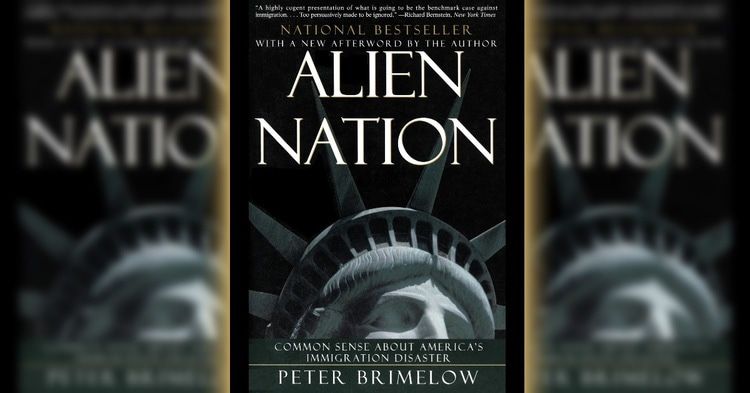
Alien Nation Review: National Catholic Reporter, July 1995
07/28/1995
Bigoted Brit Gives New Meaning To Know-Nothing
National Catholic Reporter, July 28, 1995
Alien Nation.
Thomas E. Blackburn.
© National Catholic Reporter 1995
Primarily because he can write like a radio talk show, a British immigrant to our shores has put himself in the middle of the debate over immigration. Peter Brimelow’s Alien Nation, which has been reviewed everywhere, says there are too damn many foreigners showing up in his adopted, country.
Brimelow is the kind of debater who raises a noisy distraction whenever his argument falters. That passes as the new intellectualism in Forbes, where he usually hangs out, and the National Review, where he started the immigration flap.
"America at the time of the Revolution," he writes, "was biracial, containing both whites and blacks. But the political nation — the collectivity that took political decisions — was wholly white." And not only white: It was "60 percent English, 80 percent British, 98 percent Protestant." And it’s been downhill ever since.
In a letter to The New York Times Book Review (May 7), Brimelow acquitted himself of a reviewer’s inference that he doesn’t consider Jews quite "white." That’s a "dangerous misfire," he says; a lot of Jews agree with him.
As Hermann Goring is supposed to have said, "I decide who is a Jew!"
Now that Brimelow’s animosity toward Jews has been disposed of, may one note his animosity toward Catholics?
We turn up only spottily. It goes without saying that the influx of Mexicans and Puerto Ricans that shocks the author is heavily Catholic. When we do turn up, though, we are wrong. The problem in Northern Ireland, doncha know, is a protracted campaign by members of the province’s Catholic Irish minority to force the Ulster Protestant (’scotch-Irish') majority to accept its transfer to the Irish Republic." (Internal quotes are Brimelow’s.)
Where we get put in our place, though, is in Brimelow’s revisionist rereading of the mid-19th century Know-Nothings. Most people think the Know-Nothings were anti-Catholic bigots — because they were — but Brimelow says nothing could be further from the truth. They were simply swell fellows who worried about making the immigrants into good Americans like themselves.
"The Know-nothings," Brimelow concedes "were, however, deeply suspicious of Roman Catholicism — at a time when enormous Irish Catholic immigration had begun, after the potato famine of 1845."
But that was natural: "No doubt bigotry played a part. But so did a quite rational concern that Roman Catholicism with its hierarchical structure, unlike Judaism with its self-governing congregations, was not a republican' religion — one that would be compatible with democracy, free institutions, law, liberty." Just consider Pope Pius IX, he continues and does. Then he tells us the Know-nothings were 'above all' against slavery.
Since Brimelow is not a historian, he may not be familiar with Section 1, Article Ill, of the Know-Nothing constitution: "The object of this organization shall be to resist the insidious policy of the church of Rome, and other foreign influence against the institutions of our country by placing in all offices in the gift of the people, or by appointment, none but native-born Protestant citizens."
The Know-nothing American Party, he says later, "turned out to be an acceptable halfway house for voters moving from the Whigs to the Republicans." And still later he says the Know-nothing insurrection was the "reaction, harsh but human, of a Protestant nation" scared witless of being overrun by Irish. But the Irish, thank God, proved to be "finite after all."
They stopped swarming.
In case you think that was then and this is now, Brimelow informs us that the cause of former Canadian Prime Minister Trudeau’s "neurosis" was "growing up in a province totally dominated by the Roman Catholic church and the authoritarian nationalist Union Nationale government of Maurice Duplessis."
Thus does non-Protestantism make neurotics of us all.
Anyhow, Brimelow reports that you hardly hear any anti-Catholic language in the United States today, "although you can get a whiff of it by talking to abortion rights and gay rights activists."
Or by reading Alien Nation.
